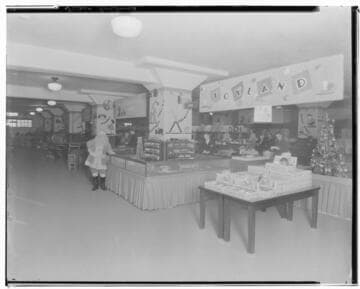Manuscripts
Monograph typescripts of Sears Jayne
Image not available
You might also be interested in
Image not available
Donald A. Sears correspondence
Manuscripts
A group of thirty-five letters, mainly letters from various authors to Donald A. Sears, and several letters from Sears to various authors, regarding the Book of the Month Club, the Book of the Month Club Writing Fellowship Program, and other literary matters. Correspondents include Ray Bradbury, Ralph Ellison, May Sarton, Karl Jay Shapiro, William Styron, Kurt Vonnegut, and others.
mssHM 59436-59470
Image not available
Lincoln's Radical Reconstruction typescript draft
Manuscripts
Copy of a typescript draft of Merlin Stonehouse's unpublished monograph Lincoln's Radical Reconstruction, which discusses Abraham Lincoln's views on post-Civil War reconstruction with several chapters focusing on specific states. Volume is spiral bound. Also present is an undated Huntington Library memo regarding the monograph and historian Allan Nevins' opinion of it (1 page) and a business card of Merlin Stonehouse.
mssHM 84038

Sears, Roebuck and Company, unloading tires, 530 East Colorado, Pasadena. 1931
Visual Materials
Two men stand next to a delivery truck at Sears, Roebuck and Company at 530 East Colorado. The men are unloading tires, which are stacked high in the back of the truck.
photCL 402 (33091)
Image not available
Sydney Ross typescripts and letter to Bern Dibner
Manuscripts
Six typescripts, one periodical with an article, and one letter written by Sydney Ross and sent to Bern Dibner. The collection contains three versions of Faraday Consults the Scholars, a lecture given by Ross at the Burndy Library in 1957; HM 83202 and HM 83202 a typescript versions of the talk from 1957 and 1960, and HM 83204 is a typescript of the author's prepublication edition of Faraday Consults the Scholars: The Origin of the Terms of Electrochemistry. Materials also include a typed letter from Ross to Bern Dibner dated 1958, December 9; three typescripts by Ross on various topics in the history of science; and an issue of Rensselaer Research, Summer, 1958, with an article by Ross.
mssHM 83202-83209
Image not available
Searing family papers
Manuscripts
A collection of 2,245 items from 1810 to 1941, it consists of correspondence, bills, receipts, banking documents, court papers, tax and school records. The vast majority of the papers pertain to William E. Valentine (1820-1896?) and his financial and real estate affairs; this material consists chiefly of bills, accounts, deeds, tax records, and banking papers. A few items concern other members of the Valentine and Searing families, including material on the U.S. Sanitary Commission. The collection also includes one map of building sites located in Long Island in 1872, and 26 family photographs.
mssSearing

Sears, Roebuck and Company toy department at Christmas, 530 East Colorado. Pasadena. 1931
Visual Materials
Santa Claus in the toy department, 3rd floor, of Sears, Roebuck and Company at 530 East Colorado. A man dressed as Santa leans on the rail surrounding a model train set, while several adults browse the toys on display.
photCL 402 (33274)